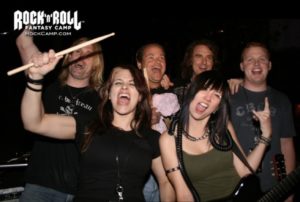
Well, let’s first get all the cards on the table…
Recently, I have been doing social-network posting for Rock and Roll Fantasy Camp, and, as a result, I can be considered a friendly witness for the company. But I started my professional relationship with camp founder David Fishof many years ago while I was at Guitar Player, and I’ve maintained that relationship solely because I believe in the camps and David’s mission. I have seen first-hand how the camps transform lives and bring joy to aspiring and talented musicians. So I thought I’d share my thoughts on why admittedly high-end rock and roll experiences (read: costly) can not only be investments in one’s musical journey, but also moments of camaraderie, collaboration, and discovery that you’ll likely never forget. I have not been compensated for this article by anyone. So, that said, please feel free to venture forth at your own risk (hahaha)…
Nearly 15 years ago, when David Fishof first contacted me about Rock and Roll Fantasy Camp, I was admittedly a tad cynical. I was aware of the sports camps that the rock camp was inspired by, and I thought to myself, “Okay, it’s a bunch of rich people who consider themselves to be decent musicians who want to hang with stars.”
Invited to actually check out a camp and join one of the camper bands, I knew that I had been an arrogant putz within ten minutes of walking into the rehearsal hall.
I was a convert, but to this day, I still hear from friends, acquaintances, and other musicians who are suspicious of laying down good money to attend events such as Rock and Roll Fantasy Camp, Joe Satriani’s G4 Experience, Vai Academy, Mike Portnoy’s Percussive Nation, and the many more exhibitions of immersive music get-togethers offered each year.
Obviously, I can’t speak to personal budget scenarios—and no one (not even the camp promoters) want anyone going into bankruptcy just to attend an event—but I can talk about what I witnessed at the Rock and Roll Fantasy Camps I jumped into in 2006 (as a camper myself in Hollywood) and 2014 (when Guitar Player co-presented a guitar camp in Las Vegas with Steve Vai, Eric Johnson, Orianthi, John 5, Elliot Easton, Gary Hoey, and others).
Read about my 2006 camp experience here.
I kept my notes from both camps, and here are some of the perceptions, observations, and real-world experiences I had…
The Campers Are SERIOUS
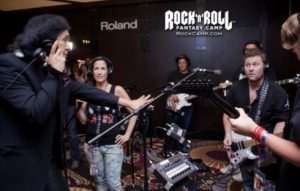
Sure, it’s easy to look at a lawyer, an investment banker, a corporate executive, or some other well-heeled individual who is not a so-called “professional” musician and call them dilettantes. I did. But I was so wrong. In fact, many of the campers could play as well—or even better—than some respected pros. In addition, these campers were passionate about the music and players they loved, and they practiced really hard to get their chops to a high level. Even the beginning musicians who made the scene compensated for a certain lack of technique and experience with their enthusiasm and willingness to improve. Personally, I never met a camper who simply wanted to hang with rock stars and not do the work to make their camper band as good as it could be. Furthermore, most of the campers were gear zealots who knew almost everything about the tools of their trade, and they could also talk with true understanding about rock history, great players, and music in general.
It’s Hard Work

No one—including the counselors—is coddled at the camps. Of course, there are breakfasts, lunches, dinners, and other goodies available, but many of the campers dash through the “luxury” bits to get back to their bands to practice, or take in a seminar with pros, or attend interview sessions with noted rockers, or even spend whatever downtime they have practicing. The musical onslaught is near 24/7, and it takes a certain level of commitment to get through everything and absorb all the knowledge being shared. I know a few certified rock stars who would melt into yogurt goo if they had to keep up with even some of the beginning campers.
The Stuff of Dreams Happens Without Warning
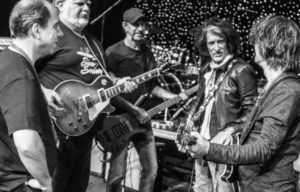
True story. The drummer in my 2006 camper band was bummed out. She wasn’t having fun, and she felt like she wasn’t playing well. She talked about leaving the camp. When she wasn’t complaining, she’d go on and on with obvious delight about how Bun E. Carlos of Cheap Trick was her favorite drummer of all time. One day, while we were rehearsing for our camper concert, the gang from Cheap Trick visited the camp, and Bun E. Carlos walked into our studio space with vocalist Robin Zander. Our drummer was completely floored, and when she told Bun E. her fears regarding her playing, he slid in behind her kit and offered to give her a drum lesson right then and there. Needless to say, she didn’t quit our band after that tutoring session! And this is just one example of how helpful, nurturing, and approachable most of the rock stars are at these camps. Nearly everyone who attends has a story about meeting their favorite musician and getting their mind blown by some act of kindness, an impromptu lesson, or just being able to stand on stage and play with them.
To illustrate this point further, here’s a short film completely composed of cell-phone video from the campers at the recent Nashville Camp with Jonathan Cain and Steve Smith of Journey, Frank Hannon and Brian Wheat of Tesla, Nuno Bettencourt, and others.
There Really Is No Competition Between Campers
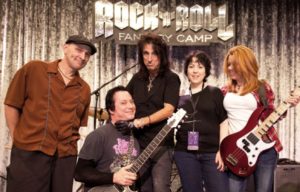
Musicians can be such jerks. I had to negotiate tons of barbed comments from players criticizing other players during my tenure at Guitar Player, and stupid ego-driven crap still happens when I meet other bands on the club circuit with my group, The Trouble With Monkeys. (“Really? You’re not going to move the keyboard rig a couple of feet so we can fit our band on that side of the stage?”) But none of that stuff seems to happen at camp. Beginners, intermediates, and more advanced players all get along and help each other out. Yeah. It’s kind of a miracle. Camp reminds me of the Continental Hotel in the John Wick movies, where professional assassins aren’t allowed to fight with or kill each other while they’re staying at this neutral territory. As a music journalist for more than 40 years, one of my jobs has always been to evangelize music making and nurture the next generation of players. It’s great to see that mission happening almost organically at rock camp.
The Rock Stars Enjoy the Experience as Much as the Campers
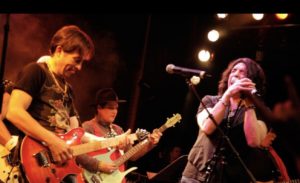
If you’re being somewhat uncharitable, you’d probably surmise the rock stars can’t wait to get their checks and dash out of the camp as fast as humanly possible. Again—not true. There are so many examples of rock stars not only being extremely gracious about giving back to the assembled multitude, but also being personally affected, thrilled, and energized by working with the campers. In this glorious bubble, there’s almost no delineation between rock star and non-rock-star. Everyone attends to celebrate music, and from that level playing field (so to speak), the stars and non-stars tend to act like a bunch of friends at a huge, backyard party. I have never witnessed any big-timing on the part of the stars—just a lot of shared music making.
So If You Can Afford the Price of Admission…
This article has been specifically about Rock and Roll Fantasy Camp because I personally attended the camps, I have made life-long friends with some of the musicians in my camper bands, and I’ve interviewed many campers and counselors about their experiences. But what I’ve described at Rock Camp can also be applied to other rock-star gatherings. I’m well aware that attendees of Joe Satriani’s G4 events have great times, as well, and I know from talking to Joe himself that he loves meeting his fans, sharing knowledge, and playing with the other musicians. I’m sure it’s no different for Steve Vai, Mike Portnoy, and all the stars who commit to inviting fans and players into their musical worlds in order to share pieces of their creative processes.
And, yeah, I get that some of you will still be frustrated that these events can be pricey. But keep in mind that the production costs can be astronomical—artist and staff fees, equipment, transportation, food, promotion, insurance, space rentals, and so on. I doubt anyone jumps on this type of business plan to sit back in a vintage Eames lounge chair to feast on Himalayan plums and count their bitcoin billions. Artists and promoters need to eat, of course, but my first-hand experience has shown that these people put on music camps because they truly enjoy seeing lives changed.



Great article. After my 4 days at camp, I walked away with a greater appreciation for personal growth, teamwork, leadership and more importantly confidence… I had fun playing with other musicians, and discovering me in the process.
Very well written as expected. You captured the essence of my experience. The only thing i would add is that the network of friends that the camp gives you (including you) is the real treasure. I have made life long friends, have recorded music, have gone on cruises, and visited and received visitors with great people i would never have met. Its a true affinity group, and enriches the participant. Thanks.
I was privileged to play with Rey More and the rest of my band and our counselor, the great Billy Sheehan. Billy took the time to sit down with me and teach me music fundamentals that I will carry for the rest of my life. Yes, it is expensive, but what is life about life experiences.